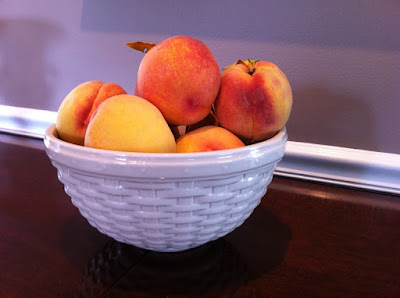
Not a painting, but not a problem, either.
Too many peaches.
There is no such thing, you may say; or this is a good problem to have. But I have too many peaches. I made my first foray to the orchard last week and erred toward the large in choosing my poke of peaches, to make sure I had enough for the pies I had in mind. The pies have since come and gone. But the peaches? Still they remain.
I invited Ron to take home a few, and Jackie and Norma have had at least one daily with lunch. I’ve found them perfect to put on cereal in the morning. And still they remain.
When I was at the market, I marveled at the large boxes of “seconds” – fruits and vegetables that weren’t quite pretty enough, but merited eating nonetheless, and at a bargain price if you bought the big lot. A bushel of pattypan squash, anyone? Even if I had gazpacho on my mind, those boxes held too many tomatoes.
August is the most wonderful time of the year, as you have heard me exult before, and this is among the reasons. For the goodness of the earth, as the song says; and what was impossible to find out of season, suddenly superabounds so as to be problematical. Too many peaches! What to do with them?
Excess is God's trademark in his creation. So observed Joseph Ratzinger in his Introduction to Christianity, before he was Cardinal, not to mention Pope Benedict XVI. This concept was introduced to me most memorably by my seminary neighbor, (now Fr.) Peter Idler of Camden (NJ), when he enthused to me over how many acorns a single oak produces, just to make possible a future oak. How much moreso, he observed, is God’s grace superabundant for our salvation? So here we are with too many peaches.
Peaches, unlike acorns, are perishable; short-lived in their usefulness and almost ephemeral in their perfection. This places on us an imperative both morally and practically not to let them go to waste; hence the panic of too many peaches.
Speaking of too many to manage, there is an old saying about feathers being shaken from a pillow on a rooftop. Likened to words of gossip, or calumny even, how can anyone ever re-gather them? Too many feathers!
But if the bad cannot be returned to confinement and control, how much less so the good, and above that, God’s own abundant good? If indeed, as our holy Pope Emeritus observed when he was a frisky young scholar and priest, Excess is God's trademark in his creation, then how can the good fruits of God’s grace be gathered up, placed in a poke, and liquidated as seconds?
If God reveals something of Himself in every oak that lets fall a superexcess of acorns each year, among innumerable and magnificent oaks both ancient and young, how much greater the excess of His providence for our thriving?
This is the marvelous, mathematically improbable muchness in which God gives life to you, to me, to the world. The life He gives is eternal, a concept also mathematically difficult but personally welcome because unlike peaches, you cannot have too much of it. This sweet fruit will remain.
You have not chosen me: but I have chosen you; and have appointed you, that you should go, and should bring forth fruit; and your fruit should remain: that whatsoever you shall ask of the Father in my name, he may give it you. (John 15:16)
What God has given to you, and to me, does not exceed what is healthy or beneficial. The good fruit borne in our lives will not rot in a bushel basket. Every gift given, every grace received expands but does not exhaust the abundance. This week’s too many peaches has already dwindled to four, soon to be devoured. The fruit that God has appointed to you? The seed of future glory, it remains.
Monsignor Smith